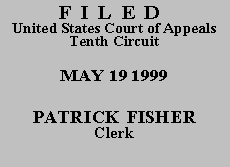 UNITED STATES COURT OF APPEALS
UNITED STATES COURT OF APPEALS
 UNITED STATES COURT OF APPEALS
UNITED STATES COURT OF APPEALS
| ALTA L. HASTING,
Plaintiff-Appellant, v. KENNETH S. APFEL, Commissioner, Social Security Administration, Defendant-Appellee. |
|
Claimant Alta L. Hasting appeals the district court's order(1) affirming the Commissioner's decision to deny her application for supplemental security income benefits. She alleges disability since January of 1995 due to breathing problems and back pain. Following a hearing, the administrative law judge determined at step five of the five-step analysis, see Williams v. Bowen, 844 F.2d 748, 750-52 (10th Cir. 1988) (discussing five steps), that claimant could perform a restricted range of light work existing in significant numbers in the local and national economies. Therefore, the Commissioner determined that claimant was not disabled within the meaning of the Social Security Act. On appeal, claimant contends that the ALJ failed to develop the record because he did not obtain necessary medical evidence. We agree. Therefore, we reverse and remand for further proceedings.
We review the Commissioner's decision to determine whether it is supported by substantial evidence and whether correct legal standards were applied. See Hawkins v. Chater, 113 F.3d 1162, 1164 (10th Cir. 1997).
Claimant argues that the Commissioner failed to meet his duty to develop the record when he declined to order further testing of her respiratory disorder. To require further investigation, a claimant must raise the issue to be developed, showing that it is, on its face, substantial. See Hawkins, 113 F.3d at 1167. "Specifically, the claimant has the burden to make sure there is, in the record, evidence sufficient to suggest a reasonable possibility that a severe impairment exists." Id. If the claimant does so, the ALJ must exercise "reasonable good judgment" to "fully and fairly develop[] the record as to material issues." Id. at 1168 (quotation omitted). "This duty is especially strong in the case of an unrepresented claimant." Carter v. Chater, 73 F.3d 1019, 1021 (10th Cir. 1996).
In this case, claimant was not represented at the administrative hearing. She requested that a breathing test be performed. The medical evidence included an evaluation by the consulting physician, Dr. Jennings, who found "[d]yspnea on exertion, probable chronic obstructive pulmonary disease secondary to smoking." Appellant's App. at 71. The ALJ quoted Dr. Jennings' assessment but did not explain why he rejected it.
The Commissioner argues on appeal that Dr. Jennings' assessment may be disregarded because it was based solely on claimant's own statements, not on clinical or laboratory findings, as required by 20 C.F.R. pt. 404, subpt. P, app. 1, § 3.00(A). Section 3.00(A), however, recognizes that one of the "most common symptoms attributable to [chronic disorders of the respiratory system is] dyspnea on exertion." If that symptom is present, § 3.00(A) directs that "a thorough medical history, physical examination, and chest x-ray or other appropriate imaging technique" is required to establish chronic pulmonary disease. "Pulmonary function testing is required [when] a disease process is established by appropriate clinical and laboratory findings." Id.
Claimant was diagnosed as having dyspnea on exertion, but no diagnostic tests were performed. The consulting physician found sufficient grounds to state that claimant probably had chronic obstructive pulmonary disease. Claimant testified that she became short of breath after minimal exertion. There is nothing in the record to contradict Dr. Jennings' assessment and we find no reason to reject it. The record contains sufficient evidence to suggest a reasonable possibility that a severe impairment exists and claimant raised the issue to the ALJ. Consequently, the case is remanded for development of the record on claimant's respiratory condition. To the extent the Commissioner argues that claimant must demonstrate that she cannot afford medical treatment before she is entitled to medical testing at government expense, we do not impose such a requirement.
The judgment of the United States District Court for the Northern District of Oklahoma is REVERSED, and this case is REMANDED for further proceedings in accordance with this order and judgment.
Entered for the Court
Circuit Judge
*. This order and judgment is not binding precedent, except under the doctrines of law of the case, res judicata, and collateral estoppel. The court generally disfavors the citation of orders and judgments; nevertheless, an order and judgment may be cited under the terms and conditions of 10th Cir. R. 36.3.
1. The parties proceeded before a magistrate judge. See 28 U.S.C. § 636.